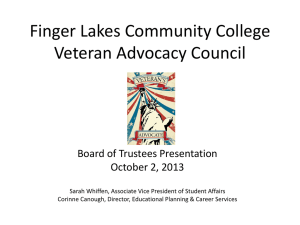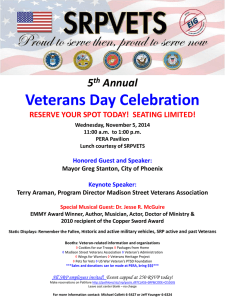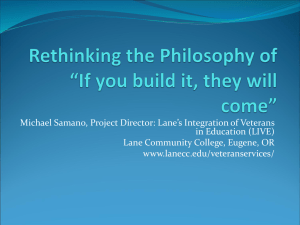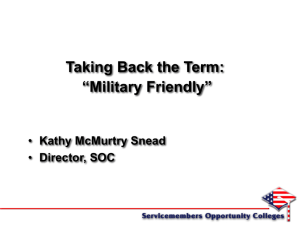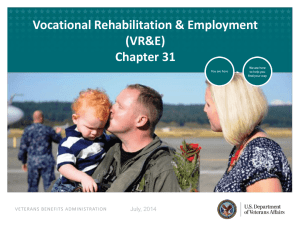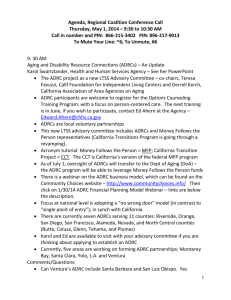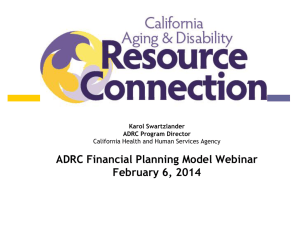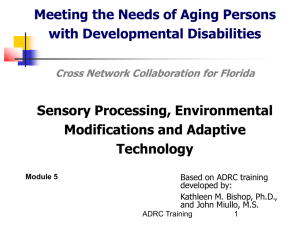A Partnership Model to Connect Rural Veterans with Aging and
advertisement
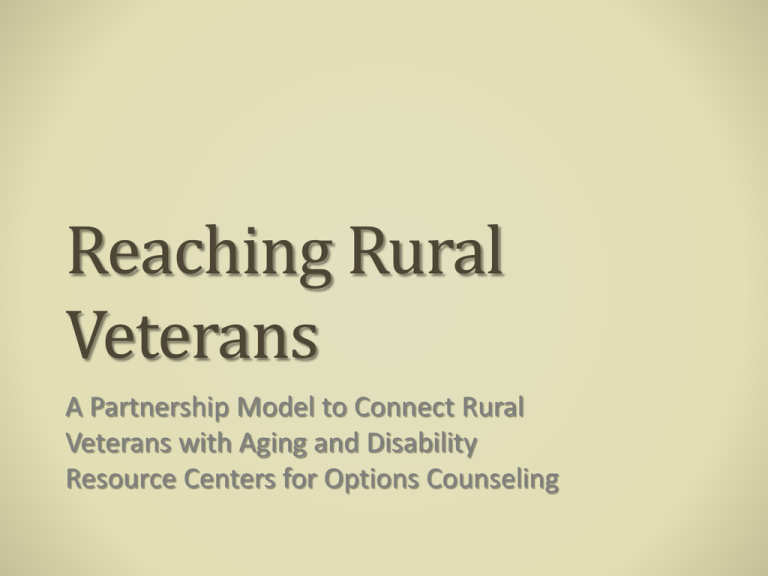
Reaching Rural Veterans A Partnership Model to Connect Rural Veterans with Aging and Disability Resource Centers for Options Counseling Presenters • Jennifer Morgan • Director, Utah Aging & Disability Resource Center • jen.morgan@utah.edu • www.utadrc.org • Bret Hicken • Geriatrics Lead, Veterans Rural Health Resource Center-Western Region • bret.hicken@va.gov Outline • Introductions • Who are rural Veterans? • Improving access for rural Veterans • ADRC Survey • Options counseling project Survey • Are you working with Veteran clients? • Do you routinely ask if a client is a Veteran? • When you find out a client is a Veteran, do you know how to help him or her access their benefits? Rural Veterans • 30% of US Military Veterans live in rural areas • Rural youths 22% more likely to enlist in military • Limited access to: • VA Healthcare (incl. mental health) • VA information resources • Assistance with enrollment and applications VHA Office of Rural Health Mission • Improve access and quality of care for rural Veterans ORH Strategic Focus Areas VHA Office of Rural Health Western Region Salt Lake City, UT Central Region Iowa City, IA ORH Washington, DC Eastern Region, Gainesville, FL Utah Aging & Disability Resource Connection Mission • To serve as single point of entry into the long-term supports and services system for older adults and people with disabilities and their caregivers. Utah Counties Served by ADRC’s Two Additional ADRC Sites in 2013/2014 • Five County (Southern Utah) • Davis County Family and Aging Services Utah ADRC Area Agencies on Aging • Bear River** • Salt Lake County Aging Services** • Mountainland** Centers for Independent Living • Ability First • Active Re-Entry • Roads to Independence **Currently participating in project (data) Information about Veteran Benefits 2010 National Survey of Veterans • 41.0% had basic understanding of their VA benefits • Knowledge of specific benefits lower • 28% had used VA healthcare • 42% of nonusers not aware of VA healthcare benefits • 26% did not know how to apply for healthcare http://www.va.gov/SURVIVORS/docs/NVSSurveyFinalWeightedReport.pdf Improving Access to Information • Bring the veteran to the VA • Transporting rural veterans to urban VA facilities • Take the VA to the veteran • Employing mobile methods to reach out to Veteran • Virtual outreach • Web or telehealth • Collaborate with non-VA organizations in rural community Looking for information? Respite Medical Care Financial Needs Adaptive Equipment Home Care Long Term Care Transportation Peer Support Legal Assistance End Of Life Care ADRC Survey Do you regularly assess a caller’s Veteran status? 5.3% Always 36.8% Usually Never 57.9% Challenges… • Rarely connect with VA to address Veteran needs • Lack basic information about most VA benefits • General awareness of VA information resources—not very helpful • Most positive feelings about VA resources with a personal contact at VA “Come down and work with our case managers, help us have contacts, help understand the paperwork and what is needed.” Respondent Comment ADRC/VA Pilot Project • Collaboration between • Utah ADRC • Salt Lake VA Regional Office • Salt Lake VA Medical Center • ORH Funding • Start date: March 2013 Goals • Create access point for rural Veterans • Provide options counselors training in VA Benefits • Build relationships with the VA and ADRC • Expand to all Utah ADRC sites in rural areas • Disseminate to ADRC programs nationwide Pilot Intervention • VA Benefit Specialists provide in depth training to all options counselors at ADRC agencies in Utah. • Training on benefits, eligibility, and enrollment/application procedures. • Building a relationship between the VA resources at the Medical Center and within communities. • Options Counselors use their expertise along with their new knowledge of Veteran Benefits to help local Veteran clients. Training Content Since February 2013 • Veteran Benefits Specialist has provided 5 in depth trainings to ADRC Options Counselors statewide • Utah ADRC Annual Meeting August 2013 Veteran Health Administration Service and Benefits • On the job training – working with VA Outreach Specialist • As of September 1, key Options Counselors have over 20 hours of VA Benefits training ADRC Options Counselor “The information provided yesterday (and at the previous training) was very helpful because I knew where to look to find the answers. This was the first time I felt somewhat knowledgeable in this area. Just wanted to say thanks for all your support!” An Options Counselor asks… “Have you ever served in the Military?” Initial Successes • First month of data showed an major increase in referrals to Veteran Programs. • Veteran clients and caregivers realize a true one stop shop receiving information on veteran, public and private programs. • ADRC sites are incorporating Veterans information into their existing outreach efforts and looking for more non traditional settings for outreach. No Wrong Door Public, Private, and Veteran Programs Veterans Older Adults People with Disabilities Why Community Partnerships? Making Connection within Communities “Knock” “Knock” Long term Impact • By project completion, our aim through these trainings and outreach events is for Options Counselors to be able to assist Veterans with basic benefit questions and to know how and where to refer Veterans for more complex needs. • A designated Options Counselor at each agency will become accredited to help veterans fill out paperwork Collaborative Community Outreach VA Think Win Win…Win • Communities • Agencies able to connect Veterans to VA resources • Expanded services to clients • VA • Improved access to Veterans • VA able to connect Veterans to community resources • Veterans • Improved access to community and VA resources Questions?

